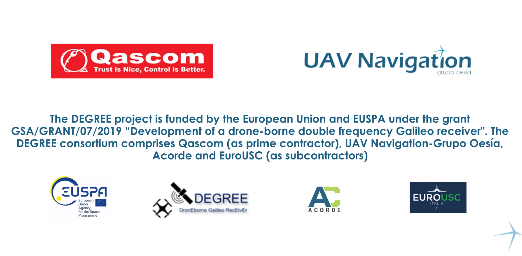Qascom in collaboration with UAV Navigation-Grupo Oesía, Acorde and EuroUSC report successfully completion of flight tests to validate the performance of the EGNSS receiver developed under the DEGREE project. The DEGREE project is focused on the development of a Galileo dual-frequency GNSS receiver intended to achieve optimum performance and take advantage of the EGNSS. This is designed to allow the leverage of several differentiators to safely integrate UAS into non-segregated airspace and U-Space. The tests focus on the requirements related to the specific category of UAS operations in terms of the security and safety of the navigation subsystems.
Sergi Dueñas Pedrosa, DEGREE Project Manager from Qascom, outlined the rigorous testing approach, stating, “A huge effort has been exerted by each member of the consortium to make these flight tests happen. The DEGREE receiver is a step closer to becoming a product thanks to this extensive and rigorous test campaign, demonstrating the performance of the technologies developed in a meaningful scenario. When a product is being developed, it is normal to use simulators to assess performance. However, it is only when transitioning to real-world scenarios that you realize how far or how close you are to delivering a product to address genuine problems. In this regard, UAV Navigation-Grupo Oesía has been crucial and an excellent partner to collaborate with”.
The European consortium’s overarching goal is to enhance the capabilities of Galileo for users globally, addressing the critical reliance on navigation data for various operations. The DEGREE project is funded by the European Union/EUSPA.
For more information visit:




